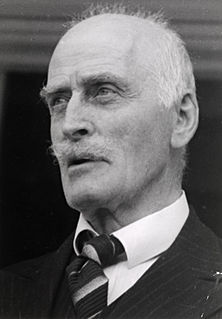A Quote by Knut Hamsun
When good befalls a man he calls it Providence, when evil fate.
Related Quotes
The mystery of God's providence is a most sublime consideration. It is easy to let our reason run away with itself. It is at a loss when it attempts to search into the eternal decrees of election or the entangled mazes and labyrinths in which the divine providence walks. This knowledge is too wonderful for us. Man can be very confident that God exercises the most accurate providence over him and his affairs. Nothing comes to pass without our heavenly Father. No evil comes to pass without his permissive providence, and no good without his ordaining providence to his own ends.
I see on a immense scale, and as clearly as in a demonstration in a laboratory, that good comes out of evil; that the impartiality of the Nature Providence is best; that we are made strong by what we overcome; that man is man because he is as free to do evil as to do good; that life is as free to develop hostile forms as to develop friendly; that power waits upon him who earns it; that disease, wars, the unloosened, devastating elemental forces have each and all played their part in developing and hardening man and giving him the heroic fiber.
The more serious poetry of the race has a philosophical structure of thought. It contains beliefs and conceptions in regard to the nature of man and the universe, God and the soul, fate and providence, suffering, evil and destiny. Great poetry always has, like the higher religion, a metaphysical content. It deals with the same august issues, experiences and conceptions as metaphysics or first philosophy.
It is a proverbial expression that every man is the maker of his own fortune, and we usually regard it as implying that every man by his folly or wisdom prepares good or evil for himself. But we may view it in another light, namely, that we may so accommodate ourselves to the dispositions of Providence as to be happy in our lot, whatever may be its privations.
All I ask of Fate is that the people she hurls into my life, whether they are evil or good, or morally bipolar, should be amusing to one degree or another.... The problem is finding smile-inducing evil people, because the evil are the most humorless, though in the movies they frequently get some of the best lines.
When one has once accepted and absorbed Evil, it no longer demands the unfitness of the means. The ulterior motives with which youabsorb and assimilate Evil are not your own but those of Evil.... Evil is whatever distracts. Evil knows of the Good, but Good does not know of Evil. Knowledge of oneself is something only Evil has. One means that Evil has is the dialogue.... One cannot pay Evil in installments--and one always keeps on trying to.


































